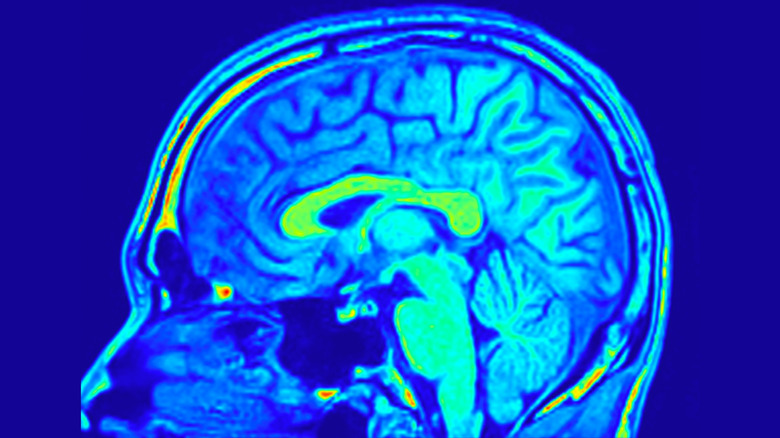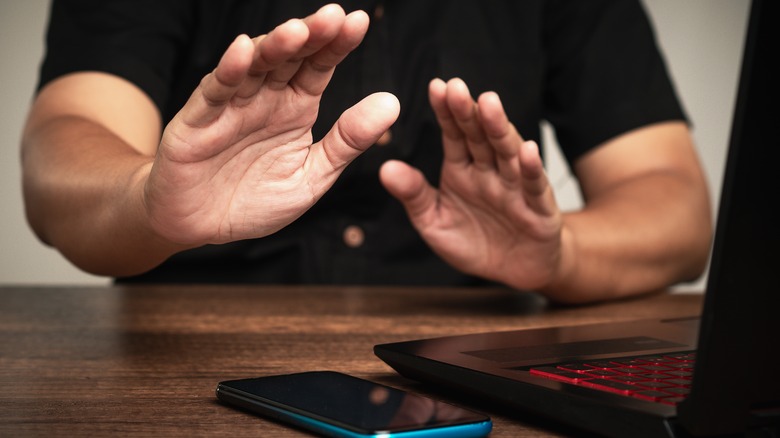7 Ways Writing Notes Down On Paper Could Give You A Cognitive Edge, According To Science
"Are you writing this down?" How many times has a teacher or lecturer asked that of a class, as everyone scrabbles to find a pen and start committing the words to paper? This may be a memory for many of us, but in the modern digital age, there's little reason to wonder what ballpoint pen ink is made of, as pens and paper have largely given way to laptops, tablets, and smartphones. With data accessible across multiple devices, it is easy to see why digital note taking is a popular option, but we may be losing more than just a tradition in tossing paper and pen to the side.
When it comes to science, typing may be faster, but handwriting is thought to have cognitive advantages over digital alternatives. From better comprehension to keeping neurodegeneration at bay, there are quite a few reasons to consider ditching the keyboard. So grab your favorite writing pen in case you want to summarize as we go, and let's take a look at seven ways writing notes down on paper could give you a cognitive edge, according to science.
Boosts memory retention
Most of us have been in a situation where we have made notes during an event, only to have very little memory of what was actually written when we revisit it. If this is you, you are not alone, and while it is tempting to blame it on your memory getting worse, changing the ways you can take more effective notes could be a simple way to improve your memory retention.
A major study by Pam A. Mueller and Daniel M. Oppenheimer published in Psychological Science has uncovered that students who took handwritten notes outperformed those who typed them, particularly when it came to long-term recall. The reason for this likely comes from the speed at which the notes are taken. If you are typing along to a speaker, depending on your typing proficiency, you may be able to keep up with them pretty well, and type what they say verbatim. Handwriting, of course, is a different story, and in the absence of writing word-for-word, your brain needs to process what is being said, then write down a more concise version of the concept. Subconsciously, you are evaluating the subject matter and summarizing it, all in a few seconds. This takes the cognitive process up a stage in Bloom's Taxonomy, from knowledge to comprehension, making it more likely that the information will stick, long-term.
If you are taking notes on something that is actually important to you — as opposed to a meeting to decide who's on cupcake duty next week — then writing them by hand will give you the cognitive edge when it comes to recalling the information at a later date.
Strengthens neural connections in the brain
While you may not feel the same physical burn as toning your quads with a set of squats, every time you carry out a task that requires concentration and active processing, you are giving your brain a workout. And just like in the gym or on the yoga mat, the more you workout, the stronger everything will become.
Perhaps surprisingly, writing by hand also falls into this category, and studies show that different neural networks are involved when we write by hand compared to typing. When electrodes were attached to participants who wrote in cursive, and others who typed on a keyboard, as expected, increased brain activity was detected in the areas related to motor control in both sets of participants. However, in those who wrote by hand, the alpha and theta bands saw an increase in activity, too. Besides delta waves, which activate in deep sleep, these are the lowest frequency bands of brain activity, and they are connected to creativity, memory, and relaxed alertness. Typing did not trigger the same breadth of brain activity, showing that handwriting is strengthening a broader range of neural activity in the brain.
This type of activity is linked to neuroplasticity, which is the brain's ability to form new connections (with plasticity being something that's also related to age) throughout your lifetime. While much is discussed of the importance of neuroplasticity after a traumatic event such as a stroke or injury, it is crucial in healthy brains, too, improving cognitive function and memory.
Sparks creativity
Have you ever started writing something by hand, and suddenly got lost in the moment where it felt like the pen was taking control and you were just flowing along with it? Writing has the ability to take your brain into a more relaxed state, which means your creativity can explode, too.
Typing doesn't have the same effect — shoulders hunched, fingers clicking away furiously — it just doesn't have the same meditative results. While drawing is widely accepted as being a creative outlet, handwriting can take the same form, especially when cursive writing or calligraphy is involved. As you form each stroke, subconsciously calculating the space needed between the letters and words, and adjusting the size of your loops to stop letters from running into each other, your brain is doing so much more than you think.
It is a more expressive process than typing, and this allows creativity to flow much more easily. In contrast, when typing, the forming of the letters is done for you, so as long as you get the mechanical part of hitting the key correct, there is no need for your creative brain to get involved at all.
Improves focus
In our modern age, our brains have become very adept at doing dozens of things at once, particularly when using an electronic device. When typing at your keyboard, it is second nature to be thinking about something else at the same time, immediately reacting to any notifications that appear on the screen.
When you are handwriting notes, however, your brain is in a totally different mindset. Handwriting is a much slower activity, and your brain slows down and relaxes with it, rather than trying to keep up with your 60-wpm fingers. When you are drawing out the letter shapes, each shape requires a different motion from the others, whereas typing each letter is exactly the same, other than the geography on the keyboard. Handwriting therefore requires more focus than typing, and in the absence of a backspace button, more concentration is required to ensure accuracy, too.
Between the increased active concentration needed to write by hand and the absence of multi-functional devices as you do it, handwriting is a much more immersive and focused activity. Rather than simply transcribing words onto a page, the connection to the content will be far more significant, making this a way to stay in a focused state while you study.
Improves comprehension
There is no doubt that for most of us in the post-typewriter age, typing notes is significantly faster than handwriting them, but with that increase in quantity potentially comes a decrease in quality. When you are typing as quickly as you possibly can, how much of the information are you truly understanding? Before your brain has a chance to process the first piece of information, your fingers have moved on to the next sentence, and the opportunity for deep comprehension is gone.
In addition to the reduced ability to recall information that has been typed, the 2014 study by Pam Mueller and Daniel Oppenheimer published in Psychological Science found that typing notes resulted in "shallower processing" than notes taken by hand, which over time translates to a poorer comprehension of the subject matter. Typing notes as someone speaks is essentially transcription, which can be done with very little active involvement, mindlessly clattering the keys as you try to keep up. The more deliberate action of internally processing the speaker's words and then summarizing them on the page has the cognitive advantage of forcing the first stage of comprehension to happen immediately, which will be beneficial when it is revisited later on. The deeper cognitive processing that handwriting affords over typing means that by ditching the keyboard you can understand the content at the time, and remember it further down the line, too.
Exercise digital self-control
Unless you intentionally have a device that is exclusively for note taking and has no internet access, taking notes digitally is always going to lead to distractions. Even when we have the best of intentions, it takes a whole lot of willpower to ignore the ping of a notification, and as soon as you give in, your focus is gone.
Distraction and lack of focus is not the only issue with our constant connection to the digital world. A study from 2019 found that excessive use of screens in adulthood can have serious cognitive consequences, and may even potentially contribute toward early onset dementia. A more recent 2024 study also found a correlation between screens and brain-related conditions, including Parkinson's. Taking handwritten notes also gives your brain a break from the immediate effects from the constant barrage of blue light from the laptop or phone, including interfering with sleep and causing eye strain. If you treat manual notetaking as an opportunity for a mini digital detox, you will see cognitive benefits in the short and long-term, and it should make it easier to exercise digital self-control as you build better habits day by day.
Makes learning more intentional
When you write by hand, rather than typing on a keyboard, you are forced to think more about what you are doing, and give a little more consideration to your thoughts. Known as metacognition, working on this skill is crucial to becoming aware of what you know, and taking steps toward improving it.
Handwriting, rather than typing, supports these metacognition skills, which include self-reflection and evaluation. This, in turn, leads to more independent learning, which can eventually manifest in increased academic success. While some of the other cognitive advantages gleaned from handwriting are incredibly useful in the short and medium term, being aware of your own learning and having the skills to constantly evaluate it will bring improved results for the long game, which is what matters the most. This type of reflective learning is closely linked to a growth mindset — the belief that progress can be made through persistence, effort, and self-evaluation. Since a growth mindset has been shown to result in better learning, it is yet another way in which writing by hand can give you a cognitive edge.







